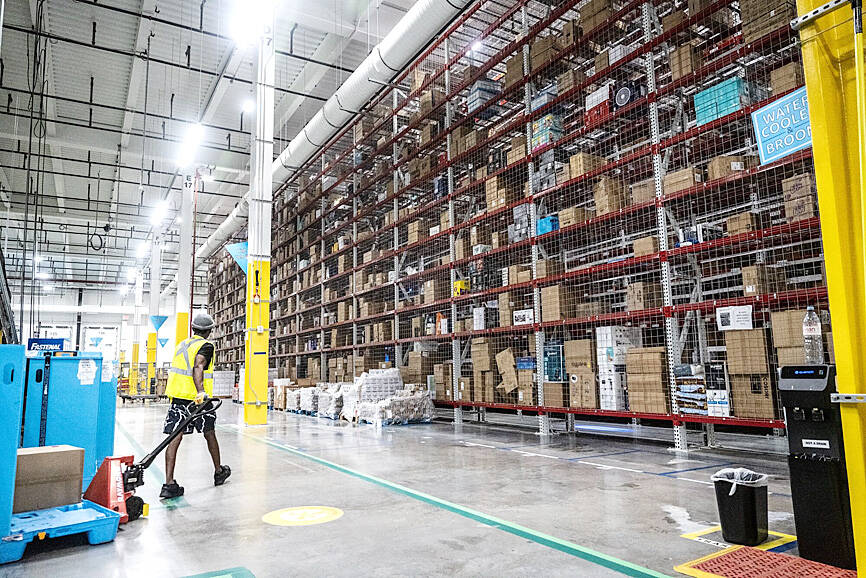Amazon.com Inc, risking Wall Street’s displeasure, told investors that profits for now would take a back seat to heavy spending on artificial intelligence (AI).
Company shares fell after it projected operating income for the period ending in September would be US$11.5 billion to US$15 billion. Analysts, on average, were looking for US$15.7 billion.
After focusing on cost-cutting during the past two years, Amazon CEO Andy Jassy said he is spending in an effort to capitalize on the boom in generative AI.

Photo: Bloomberg
Amazon has said the opportunity represents a “multibillion-dollar revenue run rate business.”
The decision to spend in the short term to take advantage of long-term growth opportunities has been embedded in Amazon’s DNA since Jeff Bezos started the company 30 years ago.
“Amazon has always had spurts of investment at the expense of short-term margins, and it appears they are planning a spurt into the rest of the year,” DA Davidson analyst Gil Luria said.
“The good news” is much of the money is going toward the Amazon Web Services (AWS) cloud unit that produced 19 percent sales growth in the second quarter — more than analysts projected, Luria said.
During a briefing after the company announced second-quarter results on Thursday, Amazon chief financial officer Brian Olsavsky said the company spent US$30.5 billion on capital expenditures in the first half of the year. That includes money for data centers required to power AWS.
He pledged to spend even more in the second half.
Amazon shares declined about 7 percent in extended trading after closing at US$184.07 in New York. The stock had gained 21 percent this year.
Amazon also provided conservative revenue guidance for the third quarter.
Sales would grow between 8 percent and 11 percent to as much as US$158.5 billion, the company said. Analysts estimated US$158.4 billion on average.
About revenue outlook, Olsavsky said the company is “seeing cautious consumers looking for deals.”
Big news events, including the Olympics, appear to have interrupted normal purchasing patterns in the quarter, making it more difficult to forecast sales, he added.
The cloud business, which suffered record low sales growth last year, continued to stage a comeback during the second quarter. AWS revenue jumped 19 percent to US$26.3 billion, beating estimates and posting its second consecutive quarter-on-quarter growth.
Total revenue increased by 10 percent to US$148 billion in the period ended June 30, compared with analysts’ average estimate of US$148.8 billion. It also posted an operating profit of US$14.7 billion. Analysts, on average, projected about US$13.6 billion.
Amazon’s operating expenses increased by 5.2 percent to US$133.3 billion, less than Wall Street projections. The company’s workforce increased 5 percent to more than 1.53 million people.
The strong cloud computing performance was offset by weakness in Amazon’s main e-commerce business. Revenue from Amazon’s seller services and advertising fell short of estimates.

Taiwan Semiconductor Manufacturing Co (TSMC, 台積電) last week recorded an increase in the number of shareholders to the highest in almost eight months, despite its share price falling 3.38 percent from the previous week, Taiwan Stock Exchange data released on Saturday showed. As of Friday, TSMC had 1.88 million shareholders, the most since the week of April 25 and an increase of 31,870 from the previous week, the data showed. The number of shareholders jumped despite a drop of NT$50 (US$1.59), or 3.38 percent, in TSMC’s share price from a week earlier to NT$1,430, as investors took profits from their earlier gains

In a high-security Shenzhen laboratory, Chinese scientists have built what Washington has spent years trying to prevent: a prototype of a machine capable of producing the cutting-edge semiconductor chips that power artificial intelligence (AI), smartphones and weapons central to Western military dominance, Reuters has learned. Completed early this year and undergoing testing, the prototype fills nearly an entire factory floor. It was built by a team of former engineers from Dutch semiconductor giant ASML who reverse-engineered the company’s extreme ultraviolet lithography (EUV) machines, according to two people with knowledge of the project. EUV machines sit at the heart of a technological Cold

CHINA RIVAL: The chips are positioned to compete with Nvidia’s Hopper and Blackwell products and would enable clusters connecting more than 100,000 chips Moore Threads Technology Co (摩爾線程) introduced a new generation of chips aimed at reducing artificial intelligence (AI) developers’ dependence on Nvidia Corp’s hardware, just weeks after pulling off one of the most successful Chinese initial public offerings (IPOs) in years. “These products will significantly enhance world-class computing speed and capabilities that all developers aspire to,” Moore Threads CEO Zhang Jianzhong (張建中), a former Nvidia executive, said on Saturday at a company event in Beijing. “We hope they can meet the needs of more developers in China so that you no longer need to wait for advanced foreign products.” Chinese chipmakers are in

AI TALENT: No financial details were released about the deal, in which top Groq executives, including its CEO, would join Nvidia to help advance the technology Nvidia Corp has agreed to a licensing deal with artificial intelligence (AI) start-up Groq, furthering its investments in companies connected to the AI boom and gaining the right to add a new type of technology to its products. The world’s largest publicly traded company has paid for the right to use Groq’s technology and is to integrate its chip design into future products. Some of the start-up’s executives are leaving to join Nvidia to help with that effort, the companies said. Groq would continue as an independent company with a new chief executive, it said on Wednesday in a post on its Web